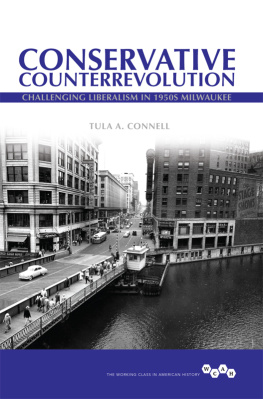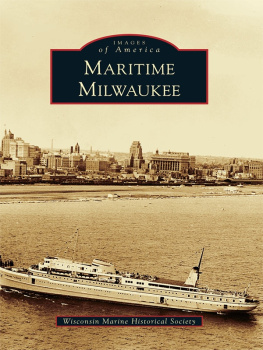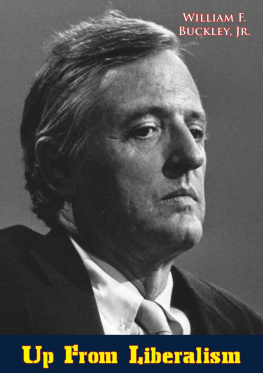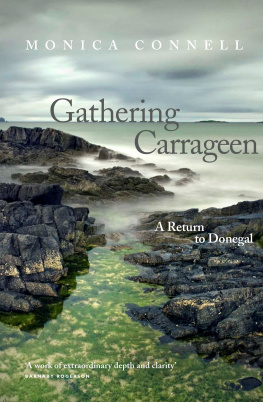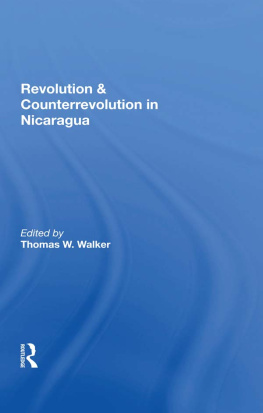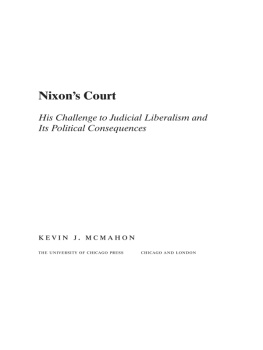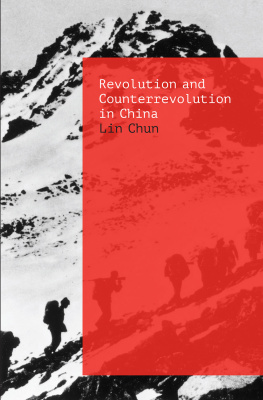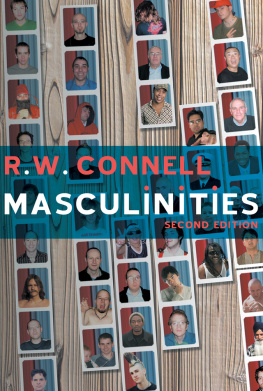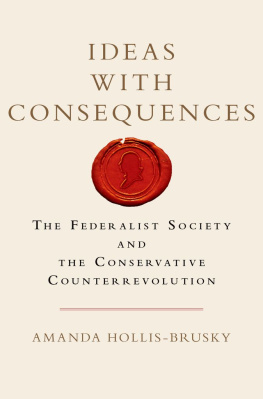Conservative Counterrevolution
THE WORKING CLASS IN AMERICAN HISTORY
Editorial Advisors
James R. Barrett, Julie Greene, William P. Jones,
Alice Kessler-Harris, and Nelson Lichtenstein
A list of books in the series appears at the end of this book.
Conservative
Counterrevolution
Challenging Liberalism
in 1950s Milwaukee
TULA A. CONNELL
University of Illinois Press
URBANA, CHICAGO, AND SPRINGFIELD
2016 by the Board of Trustees
of the University of Illinois
All rights reserved
1 2 3 4 5 C P 5 4 3 2 1

This book is printed on acid-free paper.
Library of Congress Cataloging-in-Publication Data
Names: Connell, Tula A., 1960
Title: Conservative counterrevolution : challenging liberalism in 1950s Milwaukee / Tula A. Connell.
Description: Urbana : University of Illinois Press, 2016. | Series: The working class in American history | Includes bibliographical references and index.
Identifiers: lccn 2015031905 | isbn 9780252039904 (hardcover : acid-free paper) | isbn 9780252081422 (paperback : acid-free paper) | isbn 9780252098062 (e-book)
Subjects: LCSH: Milwaukee (Wis.)Politics and government20th century. | ConservatismWisconsinMilwaukeeHistory20th century. | LiberalismWisconsinMilwaukeeHistory20th century. | Social movementsWisconsinMilwaukeeHistory20th century. | Social conflictWisconsinMilwaukeeHistory20th century. | Zeidler, Frank P. | MayorsWisconsinMilwaukeeBiography. | Milwaukee (Wis.)Economic conditions20th century.
Classification: LCC F 589. M 657 c66 2016 | DDC 977.5/95dc23 LC record available at http://lccn.loc.gov/2015031905
For John
My brother
Contents
Acknowledgments
Recognizing that it is impossible to acknowledge by name all those who have provided assistance along the way, I would like to highlight those whose support has been especially indispensable in bringing this project to fruition.
I am most grateful to the scholars who engaged with early and ongoing drafts and who offered detailed, analytical critiques that gave shape and direction to this work. Many, many thanks to Joseph McCartin, Thomas Sugrue, Adam Rothman, Andrew Kersten, Cecili Bucki, and Randi Storch for their incisive and masterly reviews.
I am deeply grateful for the support of my Milwaukee friends, new and old, whose hospitality, warmth, and kindness made a multiyear project like this particularly enjoyable. My deepest gratitude goes to Shelly and Perry Pace, who never failed to open their home to me and who never lost faith that someday, they would read the fruits of my research.
I want to extend my appreciation also to all the dedicated and expert archivists and staff whose assistance has been invaluable throughout this project. Foremost among them is Gayle Ecklund, archivist at the Milwaukee Public Library, who shared her deep knowledge of the library archives, provided ongoing assistance and, not the least, cheered me on throughout the process. Gayle is one of many incredibly knowledgeable Milwaukee Public Library staff to whom I am grateful.
Special thanks to Joanne Ricca, Ken Germanson, and all the dedicated volunteers who maintain the Milwaukee Labor Historical Society. Much gratitude to Anita Zeidler, Phil Blank, Rep. Fred Kessler, Charlotte Bleistein, and the many other Milwaukeeans whose gracious generosity with their time and assistance with this project truly represents the best of the citys welcoming open-door reputation. A big shout out to Patricia Woodhouse and Stephanie Harp, who undertook the monumental task of proofreading, and to John Goltz for his technical assistance.
Also thanks to Kevin Abing, archivist, and Steve Daily, assistant archivist at the Milwaukee County Historical Society; Ellen Engseth, former archivist at the Wisconsin Historical Society; Marge McNinch, Hagley reference archivist; Harvey Parker, Bureau of Labor Statistics economist; and Christine Silvia, researcher at the AFL-CIO. Many of the archives and libraries consulted for this project are public institutions staffed by public employees who once again have demonstrated their commitment to outstanding public service.
Most of all, I am indebted to Joseph McCartin, a mentor without peer, whose intellectual acuity steered the projects scholarly course and whose steadfast support for my work as it evolved provided the solid foundation needed to carry it to completion. Despite many commitments, he generously gave of his time, offering intellectual and practical direction that made this book possible.
Introduction
We went through a peaceful revolution in this country in 1933. We are now in the counterrevolution.
Thomas Stokes, columnist, May 1948
On June 27, 1955, as he sat in his office at Grede Foundries in Milwaukee, Wisconsin, where he oversaw the operation of multiple iron-casting plants, William Grede dictated a letter in response to a fellow Milwaukee businessman, congratulating him on his efforts to promote the philosophy of far-right conservative Clarence Manion among his employees. Such proselytization at factories and colleges was effective, Grede wrote. And it was necessary: at a time when more and more workers were signing up with unions, increasing labors economic and political strength, and in an environment in which unions and the government were working together to push for broad-based social programs, conservative business leaders needed to take action to reverse the tide. As someone said to me recently, Grede wrote, The revolution of 1933 was possible only because of the revolution that took place among the so-called intelligentsia at the turn of the century. Our job is to start a revolution in the other direction, like that of the early 1900s and hope that in the next fifty years we can swing it back.
Downtown in the mayors office, Frank Zeidler embodied much of what Grede rejected. A self-described socialist, Zeidler had won the mayoral election in 1948 at the head of a powerful nonpartisan liberal coalition and was poised to win a third term in 1956. Gredes work in the local Republican Party had failed to make inroads in challenging the citys top office, and Grede faced the threat of more liberal reforms, such as the affordable housing programs Zeidler had pushed early on. Stymied locally, Grede also had little hope of support for his brand of conservatism from national political leaders and was especially disillusioned with the moderate direction of the Republican Party under President Dwight D. Eisenhower. If the threat represented by those like Zeidler was to be repulsed, Grede believed, it would take courageous action by like-minded businessmen championing an alternative to what they saw as New Deal collectivism. Grede vowed to fight back.
As Gredes words made clear, he knew he was not alone in anticipating a decades-long struggle to overturn the social welfare programs of the New Deal and reshape the sociocultural environment away from one that accepted broad-based government involvement in the economy. When conservative intellectual Frank Chodorov initially defined a fifty-year project in 1950, he referred only to the effort to uproot socialism from college campuses. But by the end of the decade, Chodorov joined other conservatives in calling the overarching effort to undo the socialization of the American character a fifty-year project. This counterrevolution, recognized at the time by perceptive journalists such as Thomas Stokes, quoted above, was a project William Grede was determined to advance, and Milwaukee was a key battleground in this long war.
 This book is printed on acid-free paper.
This book is printed on acid-free paper.
